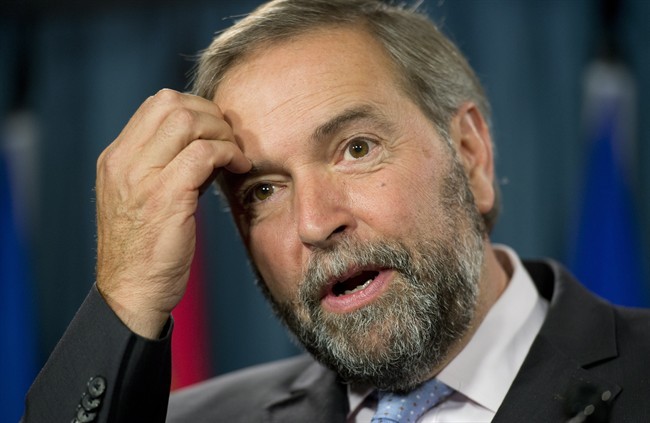OTTAWA – Put up or shut up.

That’s the politically unpalatable choice facing NDP Leader Tom Mulcair, now that the Harper government has inked a tentative free-trade agreement with the European Union.
Since taking the helm of the NDP some 19 months ago, Mulcair has tried hard to put a more moderate face on the party’s traditional anti-trade tendencies.
Read More: Early winners and losers in ‘historic’ EU trade pact
He’s championed fast-track free-trade negotiations with Japan and pushed for priority talks with India, Brazil and South Africa.
Yet so far, the NDP under Mulcair’s watch has actually supported only one trade deal, with Jordan.
He’s been walking a tightrope on the Comprehensive Economic and Trade Agreement, or CETA, with the EU.
Mulcair has professed enthusiastic support in principle for a deal, while simultaneously expressing grave concerns about Prime Minister Stephen Harper’s ability to negotiate a deal that doesn’t sell out dairy farmers, forbid municipalities and provinces from adopting buy-local procurement policies or result in skyrocketing prescription drug costs.
New Democrats are continuing to walk that fine line for now, insisting they can’t conclude whether the deal is, on balance, a good or bad thing for Canada until they’ve seen the text – which has yet to be final and may be months, even years, down the road.
Read More: Quebec supports Canada-EU trade deal
“We cannot really take a position on this until we see the text of an agreement. … We do have to take into account the impact on all industrial and commercial sectors,” deputy trade critic Guy Caron said in an interview Friday.

Get weekly money news
“If we judge that the deal is overall good for Canada, then we will support it. If we feel that Canada is not coming out well from this deal, then we’ll oppose it. But at this point, it’s really too early to say.”
Eventually, however, Mulcair will be pushed off his tightrope and the fall, on either side, carries political risk for the NDP.
If he winds up opposing the deal, he’ll be painted by Harper as an anti-trade extremist and risks jeopardizing his efforts to reassure the business community that the NDP would be prudent public administrators.
Read More: Mulcair, Trudeau assail Tory economic record
The Conservatives aren’t waiting for Mulcair to take a position on the deal. In a taste of what’s in store if the NDP comes out against CETA, Tory MPs have already adopted a new mantra: While Harper is pursuing free trade, the NDP supports “no trade” and the Liberals support “the drug trade.”
The latter is a snide reference to Justin Trudeau’s support for legalizing marijuana. But the trade deal with the EU has not actually been much of an issue for the Liberal leader, who has declared his party to be “resolutely pro-trade, pro-free trade,” although he, too, is awaiting the text.
On this issue, the Tories are training their big guns on the NDP.
In the House of Commons on Friday, Conservative MPs repeatedly accused Mulcair of opposing the deal – and all the jobs and economic opportunity they maintained will go with it – before he even sees it.
In Brussels, Harper didn’t name the NDP specifically but clearly had the party in mind when he dismissed ideological opponents of free trade as “a very small and extreme part” of the political spectrum in Canada.
Watch: Canada and EU agree on historic free trade deal
If, on the other hand, Mulcair ultimately supports the deal, he risks alienating many of the NDP’s traditional allies in the labour and anti-globalization movements, not to mention potentially angering voters in rural Quebec, where both NDP support and the dairy industry are concentrated.
“From a workers’ perspective and defending the interests of workers in Canada, we’ve expressed grave concerns on that (deal) and we would hope that the party, reading the stuff that we’ve put out and other groups have put out, would share those concerns,” said Angelo Dicaro, national representative for Unifor, the country’s largest private-sector union.
While Unifor is also awaiting the text to see if its worst fears are confirmed, Dicaro said leaks thus far suggest the CETA is less a trade deal than a “corporate bill of rights,” which would enhance the ability of corporations and private investors to “do as they see fit.”
The Trade Justice Network – which includes a cross-section of Canadian labour, environmental, farmers, student, health, human rights and public interest organizations, most of which would normally be sympathetic to the NDP – issued a statement Friday demanding immediate release of the draft text of the deal and a public review of it.
“What we have seen strongly suggests it is a bad deal for Canada,” the network said.
While it’s responsible for the NDP to reserve judgment until it has seen the text, Council of Canadians trade campaigner Stuart Trew said he’s concerned the government won’t release the text until the deal is signed.
“If the NDP – or any party, for that matter – would like to see parts of this deal changed, then the only opportunity to do that is prior to the signing.”







Comments